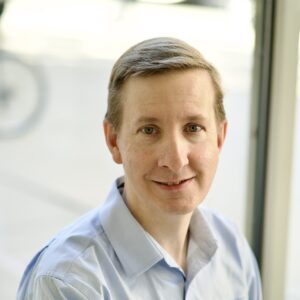
Condensed matter experimentalist Britton Plourde received his bachelor’s in physics and music performance from the University of Michigan. He then went to grad school at UIUC, earning a PhD in physics and a master’s in music performance. He completed a postdoc at UC-Berkeley, then began as an assistant professor of physics at Syracuse University in 2005, moving up the ranks to full professor there. In Fall 2024, Plourde joined the UW–Madison physics department as a full professor. He is joining the department on a half-time appointment; for the other half, he will be working at Qolab, a quantum computing startup company based in Madison.
Please give an overview of your research.
I work on superconducting quantum circuits. We make microfabricated superconducting circuits that have what are called Josephson tunnel junctions in them. And one of the biggest things we use these for is making qubits. We study all of the various physics related to how qubits work, what limits their performance, and ways to make them perform better so you could eventually build a practical, large-scale quantum computer. My research is similar to Robert McDermott’s and Roman Kuzmin’s.
What are the first one or two projects that you will have your group working on or continuing to work on when you arrive in Madison?
The company I’m working with, Qolab, is focused on building a quantum computer. My academic research lab at the university will be focused on fundamental physics related to operation of qubits, including the individual components of qubits like the Josephson junctions and to different processes that limit the performance of qubits. At the same time, the company is really focused on the technology of fabricating lots of qubits in a uniform, reproducible way and building them into a quantum computer.
In my group, a significant focus is going to be on understanding quasiparticles in superconducting qubits and how they impact the behavior of those qubits. Quasiparticles are electronic excitations above the superconducting ground state. The superconducting ground state is important because it doesn’t have any dissipation. But these quasiparticles are dissipative, and they can degrade the performance of a superconducting circuit. There are various things that can generate the quasiparticles, but one of them is radioactivity: background radiation from radioactive contaminants in the lab or from cosmic rays. My group is going to continue spending time on understanding the physics of those processes and coming up with ways to try to mitigate their effects to make qubits that are more immune to quasiparticles.
We’re also hoping to study quasiparticle physics in qubits for the completely opposite reason: instead of trying to mitigate the effects of quasiparticles to make better qubits, it’s to amplify the effects of quasiparticles to make better detectors, potentially to detect dark matter particles. Robert and I are co-principal investigators with some particle physics collaborators on two Department of Energy proposals for this work that we recently submitted. This work hasn’t been funded yet, but if it is, it is going to be a new and interesting research direction in both of our groups.
What attracted you to Madison and the university?
It’s a great department. I’ve known it for a long time because I collaborated with Robert almost as long as he’s been there. I’ve visited a lot over the years, and I like the area and the city. The university has made an impressive investment in quantum information science, and they’re a real leader in that area and have research strengths across multiple different qubit technologies, both experimentally and with a strong team of theorists working on different aspects of quantum information science and condensed matter. It’s really a powerhouse place, so I’m excited to join. University leadership has also been very supportive of the startup, they’re strongly encouraging of the entrepreneurial direction of faculty, and that’s not the case at a lot of other places.
What is your favorite element and/or elementary particle?
My favorite element has to be aluminum. That’s the superconductor we use the most. The same aluminum that you could use to wrap a hot dog at a baseball game to keep it warm, you can instead cool it down to below one degree Kelvin and it becomes a superconductor. And it makes great Josephson junctions for qubits.
What hobbies and interests do you have?
Well, I’m still a musician, I’m a flutist. I don’t really make money on it anymore, but I was a professional musician for a while. For the last three years of grad school, I had a job in a professional orchestra. I do still play occasionally, and I’ll have to see how much time I have when we get to Madison. My wife is a professional musician. She’s an oboist and she’ll be working part time in the School of Music developing a new monthly recital series.